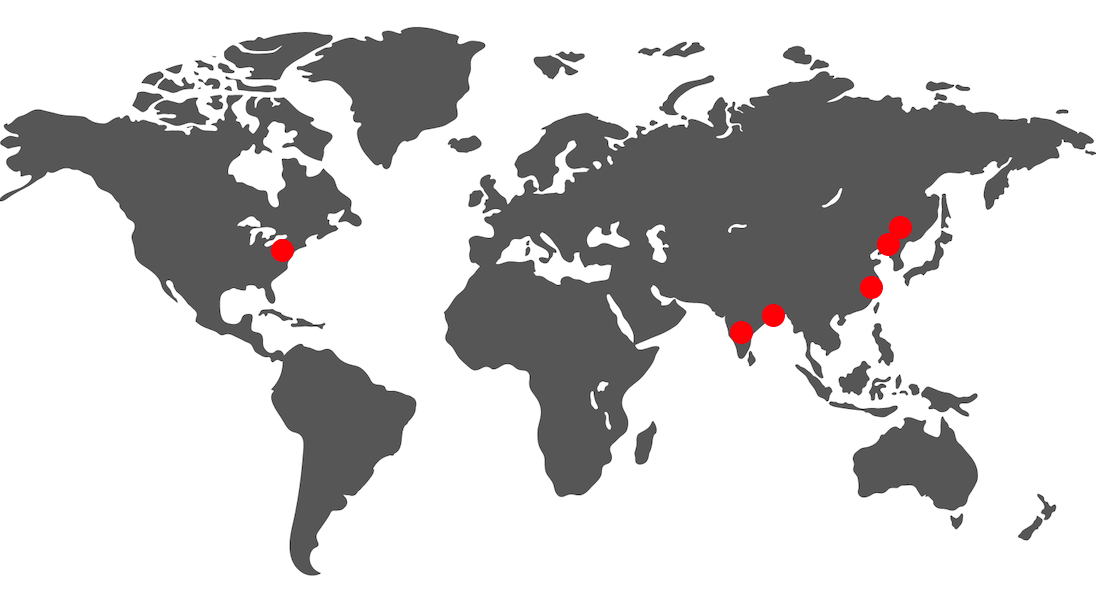Since early 2021, the Institute for Protein Innovation (IPI) has hired six scientists, bringing specialties in G protein-coupled receptors, post-translational modifications, protein expression and more to help IPI’s antibody platform tackle complex antibody targets.
We asked them about their journey to where they are today.
From left to right, IPI scientists Anita Ghosh, Matthew Salotto and Roushu Zhang. IPI photos by Pat Piasecki and Caitlin Faulds.
Matthew Salotto
Principal research associate
Start: February 2021
Hometown: York, Pennsylvania, U.S.
For Pennsylvania-native Salotto, the lab is a place to indulge in curiosity-driven experimentation. Each method or condition he tests reveals a new path for exploration; each path leads to promising new antibody candidates.
Salotto studied the thermodynamic stability of cell membrane receptors and the effect of epidermal growth factor (EGF) binding on EGF receptor dimerization at Johns Hopkins University, graduating with a master’s in materials science and engineering. He then spent five years managing antibody campaigns at Adimab, focused on platform optimization, nanodisc testing and whole-cell selection for G protein-coupled receptor targets.
He is a formidable addition to IPI’s Antibody Discovery team, busy improving sorting and selection methods to optimize antibody binding and quality.
Roushu Zhang
Scientist
Start: March 2021
Hometown: Harbin, Heilongjiang, China
Growing up in China, Zhang shared a love of biology with her mother, a physician. But instead of becoming a doctor, she found her place in the lab developing tools for diagnosis and drug development.
She launched her career at the University of Maryland, studying glycosylation and fucosylation in SARS-CoV-2 infection. Earning her Ph.D., she also worked on HIV-1 viral evasion and vaccine design, analyzing the fundamentals of glycoproteins in modulating structure, function and later therapeutic development.
With the Antibody Production team, she dissects pieces of DNA, inserts plasmids, and invents biochemical assays to optimize protein expression, validation and purification. She also serves as a mentor, eternally expanding early scientists’ knowledge and enhancing IPI research.
Anita Ghosh
Senior scientist
Start: July 2021
Hometown: Kolkata, West Bengal, India
Ghosh is the kind of scientist with all-round knowledge of structural, biochemical and biophysical methods. She’s employed that expertise to understand proteins’ role in disease pathogenesis and drug resistance.
Originally from Kolkata, India, Ghosh completed her Ph.D. in structural biology and biochemistry at Purdue University. As a postdoctoral researcher at Johns Hopkins University and later Boston University, she characterized a wide range of protein structures, from the M. tuberculosis transpeptidase paralog, LdtMt5, to oyster and clam galectin sequences.
As leader of IPI’s Antigen Production team, she focused on standardizing workflow to ensure efficiency. With that capacity to scale, she led IPI to develop and implement a new Benchling-based laboratory information management system.
From left to right, IPI scientists Shaotong Zhu, Murali Anuganti and Haiying Li. IPI photos by Pat Piasecki and Caitlin Faulds.
Shaotong Zhu
Principal scientist
Start: August 2021
Hometown: Shenyang, Liaoning, China
Zhu is a problem solver who’s made her way to IPI from China, via Texas. She likes unraveling protein structures, including the notorious GABAA receptor, for which she published the first high-resolution structure, appearing on the cover of Nature in 2018.
She completed her Ph.D. at Southern Methodist University in Dallas, focusing on membrane proteins, then landed a postdoc at the University of Texas Southwestern, where she raised monoclonal antibodies and used cryo-electron microscopy to achieve her GABAA success.
As head of IPI’s growing Protein Research team, she’s applying her structural biology and biochemistry strengths to express shape-shifting opioid receptors and ancient cell signaling molecules, and generate hard-to-reach functional antibodies to the membrane proteins.
Murali Anuganti
Scientist
Start: November 2021
Hometown: Hyderabad, Telangana, India
Since his childhood in Hyderabad, India, Anuganti has been fascinated by biological mysteries. He investigated one during his Ph.D. at the University of Connecticut, developing a surface plasmon resonance-based approach to explain how a mix of enzymes break down cellulose. The results set the stage for more economical cellulosic biofuels. As a postdoctoral scholar at the University of Nevada, Reno, Anuganti continued to hone his sleuthing via biophysical characterization. There, he engineered novel labeling strategies and used total internal reflection fluorescence microscopy to track the behavior of muscle motor proteins.
At IPI, Anuganti has applied his deep understanding of biophysics to improve quality control and analyze how well the IPI antibodies bind their targets.
Haiying Li
Senior scientist
Start: January 2022
Hometown: Zhejiang, China
Li has always been curious about the unknowns in science. Beginning with her Ph.D. at the University of Southern Denmark, she’s tapped that inquisitiveness, along the way developing an impressive skillset in liquid chromatography mass spectrometry-based proteomics. She sees the technique as the means to enable novel discoveries — a powerful tool to uncover those unknowns.
As an assistant professor at ShanghaiTech University, Li developed and directed the institute’s new Multi-Omics Core Facility. At Boston Children’s Hospital and Harvard Medical School, she worked in glycan and protein biomarker discovery related to urologic diseases.
Now, Li is bringing high-tech methods in mass spectrometry and native mass spectrometry to the table to revolutionize quality control at IPI.
This story originally appeared in our 2021 annual report. Read the full report here.
Writer: Caitlin Faulds, [email protected]


